DAN FLETCHER: MAN OR MACHINE?
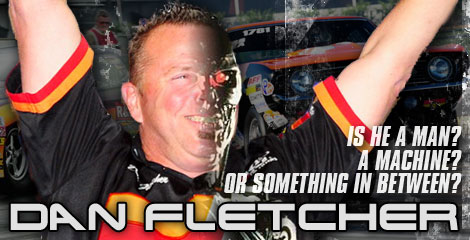 Richardson. So how does he do it? How does he win national event after national event, year after year after year?
Richardson. So how does he do it? How does he win national event after national event, year after year after year?"I don't know," said Fletcher, who'd sooner whack his index a tenth than brag. "It's a lot of hard work, a lot of preparation. There's no 'Don't worry about it,' no 'Oh, that'll be okay for one more run' with me. I don't know how anyone could ever think they're going to win when they don't put everything they have into every single detail. It's hard enough to win when you do. I check everything three times. I'm anal to a fault, and I obsess over everything."
No doubt he does. So do lots of people – they just don't win nine national events a year, like Fletcher did in 2009. He has an ability to concentrate under pressure and a knack for making the right calls at the top end that few drivers will ever possess.
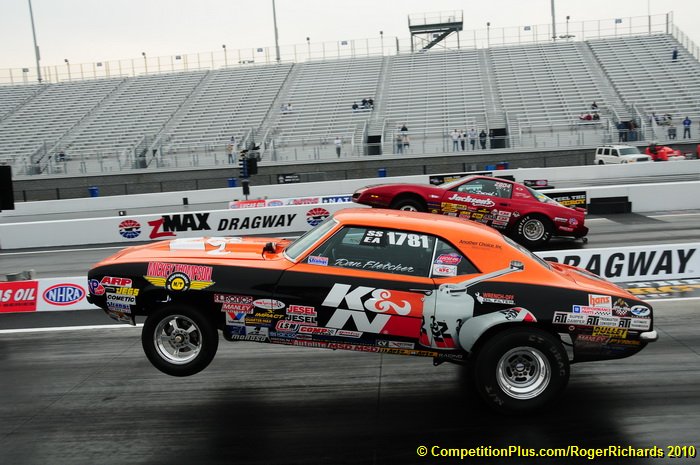
Dan Fletcher's name is way, way up the list of all-time sportsman greats, right up there with Peter Biondo, David Rampy, Scott Richardson, and Edmond 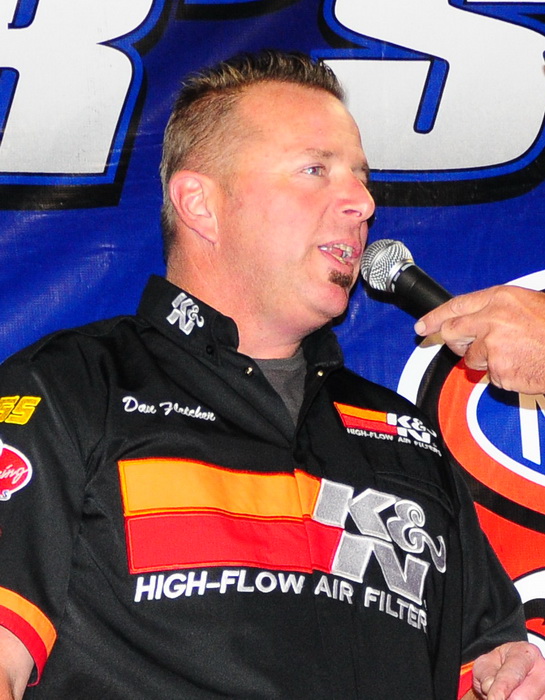 Richardson. So how does he do it? How does he win national event after national event, year after year after year?
Richardson. So how does he do it? How does he win national event after national event, year after year after year?
"I don't know," said Fletcher, who'd sooner whack his index a tenth than brag. "It's a lot of hard work, a lot of preparation. There's no 'Don't worry about it,' no 'Oh, that'll be okay for one more run' with me. I don't know how anyone could ever think they're going to win when they don't put everything they have into every single detail. It's hard enough to win when you do. I check everything three times. I'm anal to a fault, and I obsess over everything."
No doubt he does. So do lots of people – they just don't win nine national events a year, like Fletcher did in 2009. He has an ability to concentrate under pressure and a knack for making the right calls at the top end that few drivers will ever possess.
"I've never had to tell myself to focus," said Fletcher, who regularly competes in two classes at the same time. "I can't imagine not being focused. Frankly, that's the easy part. The hard part – the preparation, the study time, the analysis – is already done by the time I get to the starting line. It's just a matter of going up there and executing. Once I pull into the water, I'm just another component of the car. If just lost a final or turned it red by a thou in one car and now I'm up there in the other car, it doesn't have any effect on me once I start the engine. None of it gets to me."
Fletcher, who just won Comp at the most recent stop on the NHRA tour, the 4-Wide Nationals in Charlotte, has appeared in 99 NHRA national event finals and has won exactly two-thirds of them, 66. He's a two-time Super Stock world champ, the most prolific Super Stock driver of all time, and among the 10 winningest drivers ever in both Comp and Stock.
"When I'm up in the lanes, I'm not there to BS with people," he said. "I don't want to be their friend. I'm almost always one of the last people to get there, and it's not some psychological game I'm playing. It's because I stay at my trailer, poring over my logbook, trying to think of every last thing I might not have thought of, until the last possible second. I see people roll out of their pit area with their dial already on the window and think, 'You're kidding, right? How can you know already?' I've pulled into the water with by logbook still sitting on my lap. It's like, 'Okay, I'm holding two, the wind is worth one, the temperature is worth another two…' I'm always game-planning right up to the last second."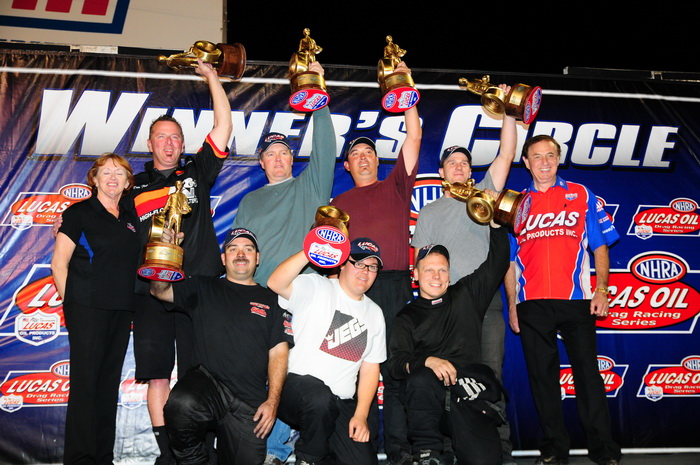
Fletcher is one of the very, very few sportsman drivers good enough to do it for a living. He left a comfortable job with Xerox and the peace of mind and security that goes with holding down a full-time job to go out on the road and try to make it as a full-time sportsman racer. It's real simple: If he doesn't win, and win a lot, he can't pay his bills. Try it sometime. More than a dozen years later, he's still out there.
"I knew it was going to be hard, but I looked at everything and thought that there was no way I couldn't make it work," he said. "When I left Xerox, I probably wasn't making $40,000 a year. I figured I needed to win two NHRA national events and one IHRA national event a year to do it."
He'd never want to say it, but to Fletcher, three national event victories represents an off year. Since he defeated current Pro Stock star Greg Stanfield in the 1994 Springnationals Super Stock final for his first major title, Fletcher has won at least one national event every year. Between NHRA races, IHRA events, and divisionals, he runs 25 to 30 dates every season.
"From the first of February to the first of November, it's basically non-stop," Fletcher said. "I drive the truck and trailer to the track, maintain everything, do the accounting, and put the proposals together. I'm not crying about it. I've been blessed to have a lot of good years, earned some good money, and had some great sponsors, but my sponsorship money isn't what it used to be. It's 15 grand to win a national event now instead of 20 grand, and expenses, obviously, have gone way up. But somehow it all works out."
Fletcher has scored 36 times in Super Stock, 17 times in Stock, 11 in Comp, and, just for the hell of it, twice in Super Gas. "The hardest class in the world is Stock Eliminator," he said. "It's almost a joke, it's so hard to win. There's no way people should be cutting lights that good, but they do. Triple-zero on the Tree and a dead-on run is available to everyone every time, and every time you pull up there, it's 50-50 whether you're going to win. In Comp, you can still win because of the performance of your car."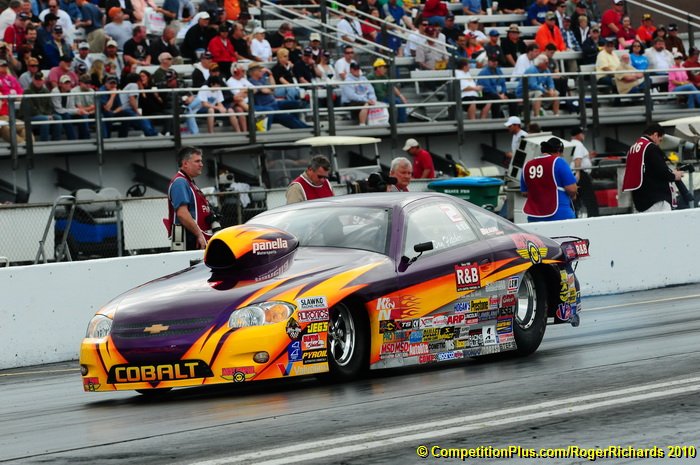 About the only thing Fletcher hasn't done is double up at a national event. He's appeared in the final round in two classes at the same NHRA national event seven times now and has yet two sweep both. Nor has ever lost both. "I've split every time," he said. "I usually lost the first one and won the second, but it wasn't like I refused to lose that second one. I was trying just as hard the first time. I've just never been able to win 'em both. That's one thing that's got to happen before I'm done racing – that, and winning the Stock championship. I'm a little upset that I haven't done better in Stock." Of course, lots of Stock drivers would love to have "only" 17 national event wins.
About the only thing Fletcher hasn't done is double up at a national event. He's appeared in the final round in two classes at the same NHRA national event seven times now and has yet two sweep both. Nor has ever lost both. "I've split every time," he said. "I usually lost the first one and won the second, but it wasn't like I refused to lose that second one. I was trying just as hard the first time. I've just never been able to win 'em both. That's one thing that's got to happen before I'm done racing – that, and winning the Stock championship. I'm a little upset that I haven't done better in Stock." Of course, lots of Stock drivers would love to have "only" 17 national event wins.
"Comp is a whole different world," said Fletcher, who drives Rick Braun's B/EA Cobalt. "Even if you've got someone covered, if they can run more than .50-under, they can beat you. If you have a fast car, Comp is a great class. There are rounds that, unless you completely screw it up, you can't lose. Then you get somebody running .75-under, and all of a sudden, Comp sucks. It's definitely a lot more work. You're not just putting the battery charger on the car and looking at your logbook between rounds. It makes Stock and Super Stock look like a vacation."
But it's in those two classes where Fletcher has amassed more than 80 percent of his wins and both of his championships (Super Stock in 1998 and 2001). "If I have an advantage over the next guy, it's at the finish line," he said. "Everybody can cut a light now – 65-year-old guys and 20-year-old guys can all hit the Tree. People have just gotten a lot better at it than they used to be. A much bigger percentage of drivers can't see six inches at the finish line. I can. You have to have good judgment down there, and you have to be able to process information quickly. At 1,000 or 1,100 feet, I've already decided if the other guy is going to get there or not, and by how much. To me, Peter Biondo is the greatest racer in the world, and it's because he's so disciplined. He always does the right thing down there."
Biondo is one of the few drivers in Fletcher's area code when it comes to national event victories. Both have multiple wins in multiple classes, and both have been doing it since the early '90s.
"You know what's sad?" Fletcher asked. "I've won enough of these things that I've gotten to the point in my life where I don't enjoy it as much as I used to. I saw the Ficcos win the Winternationals this year, and they were so happy. I thought, 'I want to feel like that again.' Now, the win light comes on in the final, and it's like, 'Whew, done.' Now let's get this thing loaded and get out of here."



